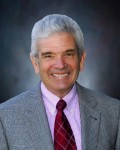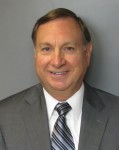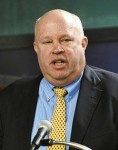Widgetized Section
Go to Admin » Appearance » Widgets » and move Gabfire Widget: Social into that MastheadOverlay zone
Public Service Profiles – Unsung Heroes
-
Ronald Bates, city manager, City of Pico Rivera
-
John F. Shirey, city manager, City of Sacramento
-
Thomas F. Prendergast, chairman and CEO, New York State Metropolitan Transportation Authority
- Ronald Bates, city manager, City of Pico Rivera
- John F. Shirey, city manager, City of Sacramento
- Thomas F. Prendergast, chairman and CEO, New York State Metropolitan Transportation Authority
Ronald Bates, city manager, City of Pico Rivera
Ronald Bates is one of three individuals that received the 2014 National Public Service Award. He has over 40 years of experience in local government. Bates serves as city manager for Pico Rivera, a modest city located 13 miles southeast of Los Angeles.
What do you do?
As city manager, my responsibility is to assure the delivery of quality services to our community and to deliver major capital projects such as the recently completed new library, four new parks and a major grade separation project on time and within budget.
What was your first job in public service?
As a junior administrative assistant with the Los Angeles City Planning Department.
What inspired you to choose public service?
An opportunity to contribute to a community and to fully utilize my abilities for the benefit of residents.
Did you have a mentor(s) that guided you when you first entered government service? What role did he/she play in your career development? If no, do you think a mentor(s) is important?
I was not privileged to have a mentor early on in my career; consequently, I made mistakes that a good mentor would have helped me avoid. Yes, mentors can be very helpful with challenging situations and also identifying potential issues the new manager is unable to recognize.
From your time in public service, share an experience that was inspiring.
Being able to deliver, with strong staff support, over $100 million in capital improvement projects including a brand new library, four new parks, a major underpass grade separation project and numerous major street improvements has been a great experience. Accomplishing the above during the last three years in a moderately sized city has been a phenomenal way to leave full-time public service.
Where do you find daily inspiration for your job?
Knowing that the kids in the community are benefiting from our efforts; for example, watching kids play and utilize the new parks with spectacular, equipment on enhanced playground areas is very rewarding.
In the face of growing anti-government sentiment, as a public servant how do you respond to criticism that the government is an inefficient bureaucracy?
Serving the community is not always easy and developing projects with community input that benefits all residents given limited budgets is challenging. So, to some extent by design, a government bureaucracy is somewhat inefficient to allow for public input; however, we as administrators build time into the process for building consensus and problem solving. The process, by design, can be inefficient but our objective is to build great community projects that meet the needs of our residents.
What is your advice to young professionals entering the public service?
Ethics is extremely important – do what is right for residents, listen to various problem solving options and always act with integrity and in the best interest of the community and its residents. Remember, while not easy, it is always better to lose a job than lose a career.
John F. Shirey, city manager, City of Sacramento
John F. Shirey was a 2014 recipient of the National Public Service Award. He serves as city manager for the City of Sacramento. About his selection as an NPSA awardee, he said “winning the National Public Service award means so much to me not only for the honor which is enough by itself, but also because I join the ranks of many distinguished public servants who I admire and respect.” A longtime ASPA member, Shirey has more than 40 years’ experience working in nonprofits and local government.
What do you do? (Focus on impact of position, not just responsibilities).
As provided for by the Sacramento City Charter and in accordance with policies, procedures, and direction of the City Council, I serve as the chief executive officer. This makes me responsible for the enforcement of all laws and ordinances; coordination of all municipal programs and services; and recommendations to the Mayor and City Council as appropriate concerning all operations, the annual budget and future requirements and opportunities for the city.
Serving as City Manager in any community provides an opportunity to guide the organization and community in positive ways. From an internal perspective, for example, I am able to provide leadership on key issues affecting our financial solvency and the effectiveness of services. From a community perspective, I provide guidance on large-scale public works projects that fundamentally improve communities. Examples include Cincinnati’s Central Riverfront Master Plan, which led to the development of two sports stadiums, a major museum, a 70-acre downtown park, and a large mixed-use development. The City of Sacramento’s $448 million entertainment and sports center will reactivate the city’s downtown.
What was your first job in public service?
My first job in public service was serving as the Administrative Assistant to the City Manager in the City of Monterey Park, from April 1972 to January 1975.
What inspired you to choose public service?
Like many people in my age group I was inspired by the call to public service by President John Kennedy in his inauguration address when he said those famous words, “Ask not what your country can do for you. Ask what you can do for your country.”
Did you have a mentor(s) that guided you when you first entered government service? What role did he/she play in your career development? If no, do you think a mentor(s) is important?
My primary mentor in my career has been Jim Hankla, the now retired city manager of the City of Long Beach and former chief administrative officer of Los Angeles County. Jim first got me interested in economic development, and I continue to emphasize the importance of the field in making and keeping a community strong and vital.
From your time in public service, share an experience that was inspiring.
The things that I am most proud of are the satisfaction of knowing I was able to change the operation of an organization to make it more effective and an enjoyable place to work and physical improvements to a city such as the transformation of downtown Long Beach, the riverfront in Cincinnati, and hopefully the downtown core of Sacramento one of these days.
Where do you find daily inspiration for your job?
The best part of serving in local governments is that accomplishment is tangible – one can see the results of your work in how an organization operates, how a community can be improved and in the lives of individuals.
In the face of growing anti-government sentiment, as a public servant how do you respond to criticism that the government is an inefficient bureaucracy?
One way to address that sentiment is to point out all that government does to improve daily life that many people do not realize or appreciate, such as turning on the faucet and not having to worry that the water is clean and safe. Instead of trying to address “government” as a whole, I describe how the government organization I lead is operating efficiently and effectively.
What is your advice to young professionals entering the public service?
If it is important to you to make a difference in the lives of people then public service is for you. The rewards are far greater than the compensation.
Thomas F. Prendergast, chairman and CEO, New York State Metropolitan Transportation Authority
Thomas Prendergast won the 2014 National Public Service Award. He has dedicated close to 40 years to working in major transportation agencies across the United States and the world moving from the state to federal and back. He currently leads the New York Metropolitan Transportation Authority, the nation’s largest public transportation agency. It services more than 8 million individuals in the New York metro area.
What do you do?
I serve as chairman of the board of the Metropolitan Transportation Authority and chief executive officer of all of its operating agencies – chief transportation policymaker and head operations officer for all subway and bus services in New York City, all commuter rail services for the Metropolitan New York area and bridges and tunnels within and between the boroughs of New York City. I lead an organization of some 70,000 employees serving over 8.5 million people daily for their work commute and personal travel needs. I am the key person responsible for developing and maintaining a whole life asset management system for a trillion dollars of total assets.
What was your first job in public service?
Senior transit planner with the Chicago Transit Authority.
What inspired you to choose public service?
I received a degree in Systems Engineering in Socio-Technological Systems with a specialization in Urban Transportation. Working in public service at an agency that enables me to utilize that degree in an area I found to be interesting (electric trains and buses) was an opportunity I could NOT refuse.
Did you have a mentor(s) that guided you when you first entered government service? What role did he/she play in your career development? If no, do you think a mentor(s) are important?
I had numerous mentors each one of which provided invaluable guidance in both technical and institutional areas of expertise and competency.
From your time in public service, share an experience that was inspiring.
By far the most inspiring experience I have had was leading the effort in restoring the New York City transit system to full operations following Hurricane Sandy.
Where do you find daily inspiration for your job?
Knowing that what I do, along with all of my fellow employees, help people get to work and do what they need to do in their daily lives.
In the face of growing anti-government sentiment, as a public servant how do you respond to criticism that the government is an inefficient bureaucracy?
Constant reinforcement of message and need for what we do and demonstrated examples of why what we do makes a difference in the lives of the public…..and a “thick skin” to unfair criticism.
What is your advice to young professionals entering the public service?
It is a very rewarding career with many challenges and opportunities that provide one with a means of making a true difference to people at a societal level.





Geoff McLennan
May 16, 2014 at 11:35 am
Hooray for John Shirey, a true survivor in the public sector. After Redevelopment was elminated in California, John found a challenging job as City Manager. He is a rare find of leadership, fairness, and empathic listening. We are blessed with his service.